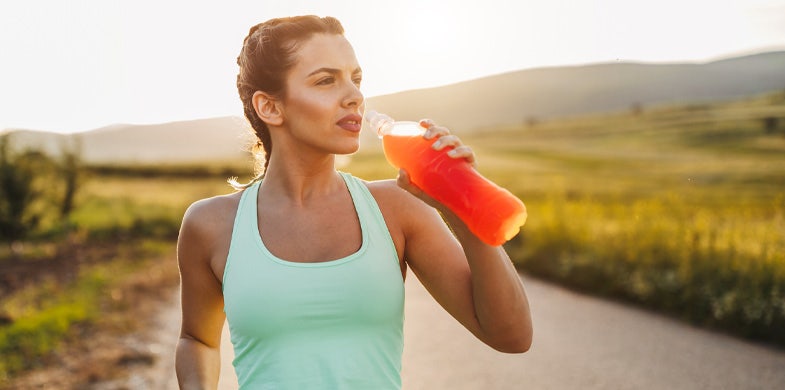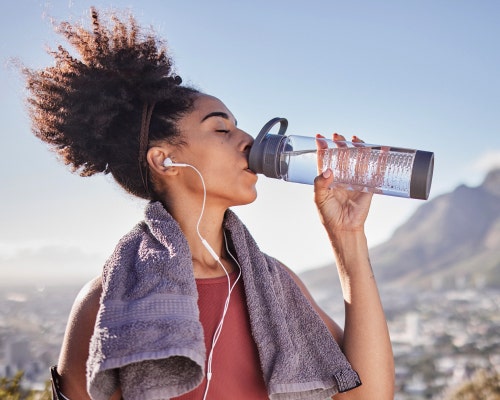

You may have seen them in ads for sports drinks to help athletes with hydration, but electrolytes quench much more than just your thirst. Electrolytes are essential minerals that are truly essential for everyone and nearly every process in your body. They maintain the balance of fluids both inside and outside your cells to keep you feeling and functioning well. If your electrolytes go too high or too low, your health hangs in the balance. So go beyond the bottle to see—and feel! —the power of electrolytes.
What are Electrolytes?
They don’t call electrolytes essential for nothing! That’s because electrolytes regulate some of your body’s most vital functions. Electrolytes are minerals, such as sodium, potassium, calcium, magnesium, and phosphorus. They’re characterized by their positive or negative electrical charge when dissolved in water. Since your body is approximately 60% water, practically every fluid and cell throughout your body contains electrolytes. They’re important because they enable your body to perform a wide range of critical functions and physical activities.
In Charge of Many Body Benefits
With their natural positive or negative charges, your body uses electrolytes to conduct electrical charges that help with key chemical reactions—which then power some of the most important processes in your body. Two of the critical are hydration and the balance of fluids both in and around your cells, which are needed during physical activity. Essentially, electrolytes help your body maintain a healthy balance by transporting key chemicals that regulate a wide range of fundamental functions, including:
-
Keeping your body hydrated
-
Maintaining a balance of fluids throughout your cells, blood and body
-
Ensuring normal blood pressure
-
Controlling the pH balance of your body
-
Supporting healthy heart function
-
Helping your blood to clot
-
Transmitting nerve signals from your nerve cells, muscles, and heart to your other cells
-
Enabling muscle contraction
-
Helping build new tissue
-
Regulating energy
-
Controlling the function of your nervous system
The Threat of Sweat & Sickness
Exercise gives your electrolytes a real workout. No wonder they’re in so many sports drinks designed for athletes and weekend warriors! During exercise, your natural electrolyte balance starts to shift as your body loses liquids and electrolytes when you sweat. This creates an imbalance and causes dehydration. But workouts aren’t the only thing that can drain your body of electrolytes. Several other things can also affect the delicate balance of electrolytes, including:
-
Extreme sweating due to severe heat
-
Prolonged exposure to heat
-
Persistent vomiting or diarrhea
-
Fever
-
Drinking too much or too little water
-
Too much alcohol
-
Taking some medications, such as steroids, diuretics or laxatives
-
Having certain kidney, heart, or liver diseases
-
Extreme diets that restrict carbohydrates
Symptoms Sparked by an Electrolyte Imbalance
When your electrolyte levels go too high or too low, this causes an imbalance that can be harmful to your health. It can even be fatal if taken too far and cause serious long-term conditions, including kidney failure, heart rhythm disruptions, and seizures. But if you just drink enough after a workout or you’re feeling under the weather, you may only have a mild imbalance and may not have any symptoms at all! But chances are, your body will let you know if your electrolytes are out of whack with symptoms such as:
-
Extreme thirst or dehydration
-
Fatigue or very low energy after exercise
-
Dizziness, especially after exercise
-
Headaches that last all day
-
Muscle cramps or sudden spasms, either post-workout or during the night
-
Nausea after working out
-
Mental confusion or “brain fog”
-
Blood pressure changes
-
An irregular heartbeat
-
Rapid heart rate
-
Just not feeling very well
It’s No Sweat to Replenish Your Electrolytes
Sure, sports drinks have the ability to replenish your electrolytes, but they also have lots of sugar, calories, and additives that aren’t needed if you didn’t power through a major workout. But you should think outside the bottle because many of these sports drinks are too high in sugar and too low in electrolytes to replenish your body’s needs. The best way to get the electrolytes your body is thirsting for is by consuming them through your diet.
Power Foods to Replenish Your Electrolytes
Knowing which foods and drinks will refill your electrolyte needs can be a real balancing act. Since electrolytes are salts and minerals like potassium, sodium, calcium, magnesium, and phosphorus, choosing foods and drinks that are full of these needed nutrients will give your body the electrolytes it’s craving and crying for. Some of your best balancing bets include:
-
Bananas – Packed with potassium, this appealing source of electrolytes is easy to grab on the go.
-
Coconut water – A refreshing alternative to regular water, coconut water is a popular electrolyte booster because it’s brimming with potassium, sodium, calcium and magnesium.
-
Dairy – Milk, cheese and yogurt bring plenty of electrolytes to the table with their high levels of calcium and sodium.
-
White-meat poultry – Turkey and chicken serve up hearty helping of potassium and sodium to balance electrolyte levels.
-
Avocado – More than a trendy topper to toast, avocados are an excellent source of potassium.
-
Watermelon – This slice of summer is also a year-round way to boost electrolytes because it’s high in potassium and made of mostly water.
-
Leafy greens – Ready to toss in a smoothie, salad, or stir-fry, leafy greens like spinach, kale, and collards have the magnesium and calcium to restore your electrolyte balance.
To keep feeling and functioning well, take charge of your electrolytes to strike a healthy balance.






